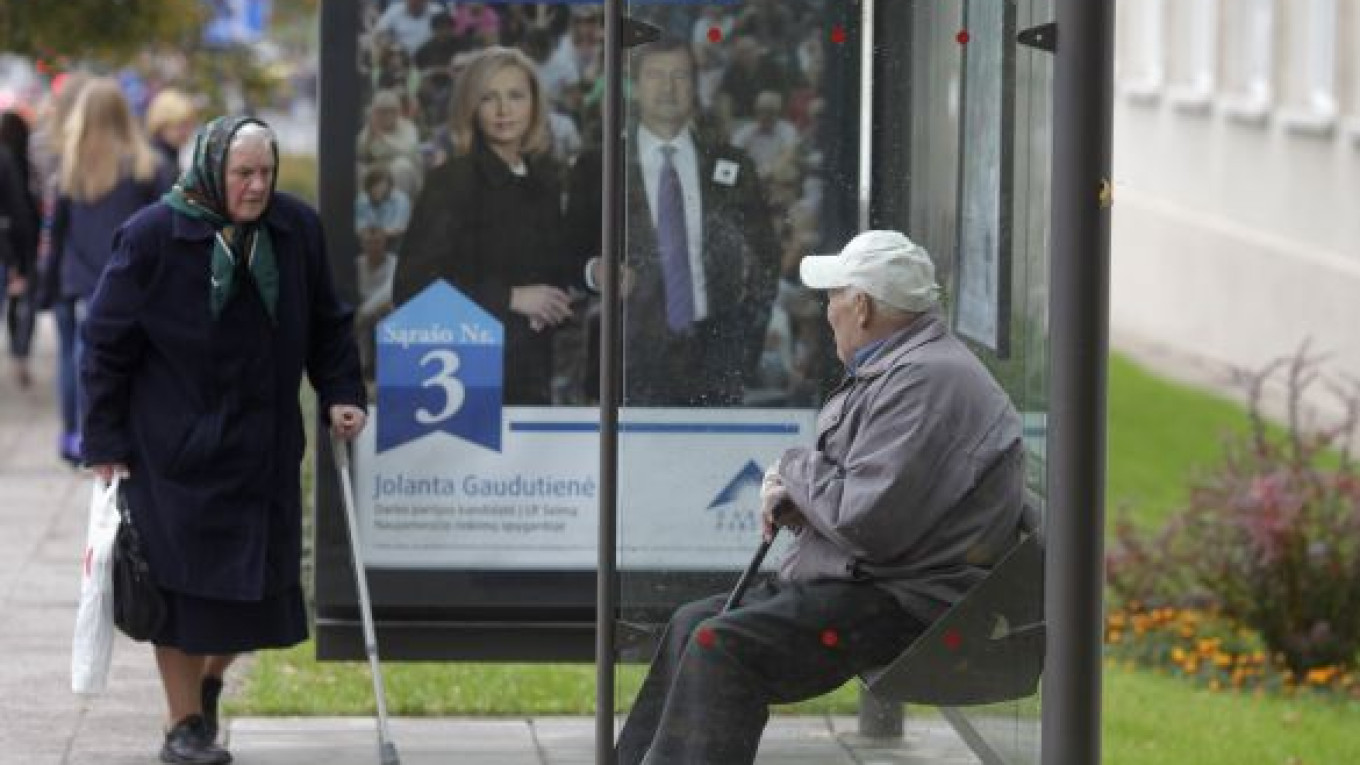Austerity-weary Lithuanians are set to eject the country’s ruling center-right coalition in an election this month, a move likely to ease ties with Russia and delay the moment the small European Union member state joins the euro.
But the new government, which opinion polls show is likely to be a broad coalition led by the center-left Social Democrats, is expected to largely stick to austerity, since the Baltic state cannot afford to be frozen out of debt markets.
“The situation is unbearable. Half of Lithuania has emigrated,” said Svetlana Orlovskaya, 65, as she headed to work as a factory cleaner in a suburb of the capital city, Vilnius.
She said Prime Minister Andrius Kubilius, head of a four-party coalition since 2008, had not done “anything good.”
The Social Democrats are led by Algirdas Butkevicius, whose first choice of coalition is with the Labor Party, led by a Russian-born businessman, and with a party led by an impeached former president, Rolandas Paksas.
The Social Democrats back more constructive ties with Russia. Kubilius sought to lower gas prices and restructure the gas industry, which the Kremlin loudly protested.
Lithuania and Russia have often had testy relations since the Baltic state regained independence in 1991.
Butkevicius also backs increases in the minimum wage and a progressive income tax that would be fairer to lower earners.
“It has to be recognized that if the situation in the labor market does not change, there could be social clashes this winter, as heating prices will rise,” Butkevicius said.
How the issue is handled may influence when Lithuania seeks to join the euro, something it is determined to do despite the currency bloc’s debt crisis. To adopt the euro, a country has to keep its budget deficit below 3 percent of output and meet targets on inflation, debt and long-term interest rates.
President Dalia Grybauskaite, a forceful former EU commissioner who oversaw budgets, has the role of choosing the prime minister after elections. She backs fiscal discipline.
Kubilius has said 2014 would be a realistic date to join the single currency, but Butkevicius said he is aiming for 2015.
Along with Latvia and Estonia, Lithuania has been held up to eurozone states as an example of how to successfully implement tough austerity measures. It cut spending and raised taxes following the 2008 global crisis.
The flip side, however, was falling wages and living standards and a 15 percent drop in output in 2009. Some growth has returned, but thousands have emigrated, the jobless rate is 13 percent and the country remains one of the poorest in the EU.
Lithuania has two voting rounds. On Sunday, half the seats will be decided on a proportional representation basis. The rest will be decided two weeks later in runoffs in districts.
The country will also vote in a referendum Sunday on whether to back a new nuclear power plant. Polls show that most people will reject it, but political parties might ignore the result, as the referendum is only advisory.
A Message from The Moscow Times:
Dear readers,
We are facing unprecedented challenges. Russia's Prosecutor General's Office has designated The Moscow Times as an "undesirable" organization, criminalizing our work and putting our staff at risk of prosecution. This follows our earlier unjust labeling as a "foreign agent."
These actions are direct attempts to silence independent journalism in Russia. The authorities claim our work "discredits the decisions of the Russian leadership." We see things differently: we strive to provide accurate, unbiased reporting on Russia.
We, the journalists of The Moscow Times, refuse to be silenced. But to continue our work, we need your help.
Your support, no matter how small, makes a world of difference. If you can, please support us monthly starting from just $2. It's quick to set up, and every contribution makes a significant impact.
By supporting The Moscow Times, you're defending open, independent journalism in the face of repression. Thank you for standing with us.
Remind me later.


